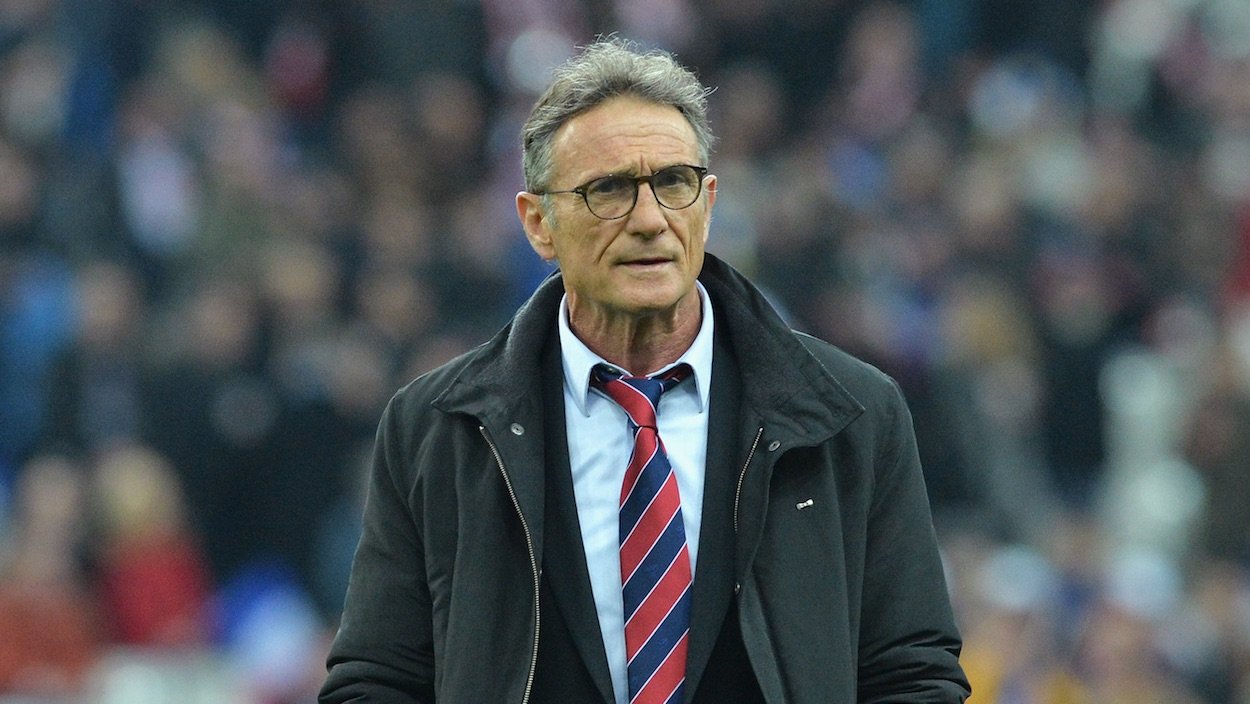Two new agreements brokered between the FFR and LNR look set to curb the number of overseas players in the Top 14 and return the French national side to its former glory. James Harrington explains.
Those of a certain age may recall the glory days of French rugby with a wistful sigh, their minds running a grainy showreel featuring highlights of a bloodsoaked Jean-Pierre Rives and a perfectly balanced Serge Blanco; the silver streak that was Philippe Bernat-Salles or Thomas Castaignède doing his tongue-out chicken dance.
Younger rugby fans, however, are more likely to admit that, much like Father Christmas, they no longer believe in this mysterious ‘French flair’ their elders whisper of in awed tones. The French rugby they know is dour and staid and uninspired. Bash. Bosh. Grunt. Repeat. And, more often than not, lose.
Those who like their rugby theories neat and tidy point to the rise of the Top 14 as the richest league in the world as coinciding with the decline and fall of the national team. Yes, club squads are full of exciting imports, they say, but quality ‘Made in France’ players are almost impossible to come by.
At first glance, they have a point. Rugby fans have known for years the French national side is a shadow of its legendary flair-filled self.
But things are not that clear-cut. Coaches have come, blamed the Top 14, blamed the clubs, blamed everyone else, and gone. But it’s not as bad as Philippe Saint-André’s constant fiddling may have led you to believe.
In fact, France has a rich supply of talent at nine and 10. It has the makings of a three-quarter line with the speed and nous to scare just about any opposition you’d care to mention. And powerful, mobile forwards? That production line is running smoothly.
The good news – if you’re French, or at least miss the glory days of French rugby – is that two halves of what has been described as a ‘small revolution’ have come together under mostly favourable stars, so that this ridiculous talent could strut its stuff on the Test stage sooner rather than later.
A historic accord between the FFR, which runs the national team, and the LNR, made up of club presidents from the Top 14 and ProD2, has allowed France coach Guy Novès to select a 30-man ‘Elite’ squad and a 20-strong ‘Development’ group. He oversees their training, game time and rest periods. He also has more time with them at key points in the calendar – November internationals, Six Nations, the next World Cup.
It would be easy to imagine Novès – who, years later than he should have done, finally took charge of France after last year’s World Cup quarter-final humiliation against New Zealand – bashing a few heads together behind the scenes to get clubs to agree to these changes.
[rugbypass-ad-banner id=”1473723660″]
He could do this because, unlike previous incumbents of the hotseat at the national side’s training centre at Marcoussis, he packs a powerful influential punch in the conservative corridors of power that run rugby in France.
That accord alone means the gnomic coach, who won four European Cups and 10 French championships with Toulouse, can begin plotting his country’s way back up the rugby pecking order.
But it’s not all. From next season, France’s 30 Top 14 and ProD2 clubs must name a minimum of 14 JIFF-qualified players in their match day squads. Those who do not reach this quota will lose points – up to 10 if they miss the mark badly enough.
In the 2014/15 season, 10 points was the difference between a European Champions Cup slot and relegation to the ProD2.
What’s JIFF, you ask? Call it a quota system if you want, but it’s typically convoluted – typically French. It stands for Joueurs Issus des Filières de Formation. Qualified players are those who have been part of a French club’s youth academy for three seasons before the age or 21, or who had been licensed to play in France for five seasons before the age of 23.
Equally, from next season no more than 16 players in clubs’ 35-man squads can be non-JIFF. That is to say, imports. Overseas players. Pension-fillers. And that’s including any medical jokers – though, crucially, not players hired as cover for those named in Novès’ Elite squad.
Most clubs support the system. Even Racing 92’s owner Jacky Lorenzetti has publicly backed the idea. Two are notable in their opposition. Toulon’s Mourad Boudjellal, who is running to be president of the LNR, has called it unworkable, while the outraged silence from Mohed Altrad, owner of Jake White’s South African player-outreach scheme at Montpellier, is deafening.
The question is: are either of them willing to risk points – and with them play-off or European places – to prove their point?
Regardless, we can expect a few out-of-contract overseas players in France’s Top 14 to start heading back home in search of a job from the end of this season.







































































